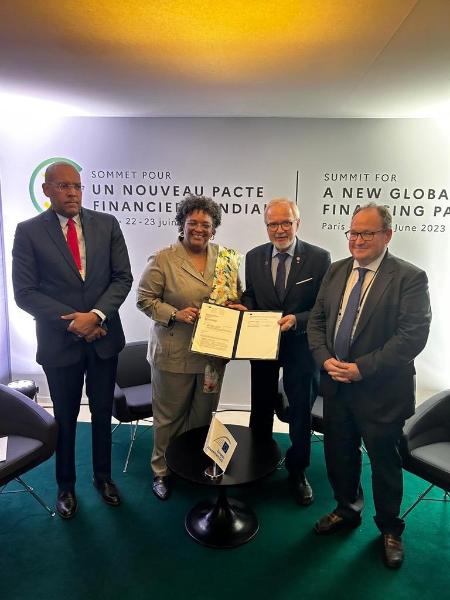
- The EIB-Barbados partnership will increase support for climate action and healthcare resilience in the country
- A €10 million loan from the European Investment Bank, guaranteed by the EU, will provide for further improvements and increased capacity in the island’s acute medical care, including the Queen Elizabeth Hospital in Bridgetown
Today at the Summit for a New Global Financing Pact in Paris, Mia Amor Mottley, Prime Minister of Barbados, and Werner Hoyer, President of the European Investment Bank (EIB), signed a memorandum of understanding setting the framework for increased cooperation and investment.
Under this strengthened partnership, the EIB will increase its support for climate action and healthcare resilience in the country. As a first step, the EIB is providing a further €10 million of concessional funding for healthcare resilience, including for the Queen Elizabeth Hospital. This extends the €50 million loan for Barbados’ pandemic response made in 2021 and is aligned with the European Union’s Global Gateway strategy.
The Queen Elizabeth Hospital is a teaching hospital located in the capital, Bridgetown, and serves communities across the island. The additional healthcare financing will go towards new equipment and buildings at the hospital, as well as refurbishment of existing facilities.
More broadly, the EIB and Barbados will work together to identify priority projects where EIB investment can have a profound and positive impact, such as in water and wastewater, clean and renewable energy and coastal protection. At the same time, the EIB is exploring ways to scale up climate finance, as called for by the 2022 Bridgetown Initiative. These include longer-term and highly concessional loans, and the possibility of including a clause in loan contracts by which a country struck by a natural disaster would be able to pause its loan repayments.
“As the EU’s Climate Bank, the EIB is committed to supporting the most vulnerable countries with fair and effective financing to build their resilience to climate change and promote a sustainable and equitable transition,” said Werner Hoyer, President of the European Investment Bank. “The strengthening of our long-standing close partnership with Barbados will allow us to have a greater impact in a country on the frontline of climate change while backing their ambitious investment goals in healthcare, water, energy and climate-resilient infrastructure.”
Mia Amor Mottley, Prime Minister of Barbados, said, “During the COVID-19 Pandemic, I believe we all learned the true value of political will and partnerships. As the world now starts to truly recognise the effects and the injustices of the Climate Crisis, I can certainly say that this moment is a clear example of how commitment and cooperation can be the catalyst for improving the lives of people in those countries most affected.
The partnership Barbados shares with the European Investment Bank continues be highly valued, and I offer my most sincere thanks to the European Investment Bank and its President, Werner Hoyer, for this opportunity to work together and safeguard our future.”
European Commissioner Jutta Urpilainen, said, “The fight against climate change, both globally and in the Caribbean, is a common priority. For the EU, this Paris Summit is an important opportunity to reaffirm that we stand ready to support our partner countries in the face of global challenges multilaterally and through our Global Gateway investment strategy. The EU is committed to supporting Caribbean partners in delivering on their own climate and sustainability objectives. The Caribbean-EU Partnership on the Green Deal, which we launched in Bridgetown last year, sets the ground for this. In addition, we are today strengthening further our partnership on health resilience with this €10 million loan, which will notably complement our support to the Queen Elizabeth Hospital announced last October.”
The Summit for a New Global Financing Pact is taking place in Paris on 22 and 23 June. The conference is looking at ways to increase financial support for the Global South and countries hit hardest by climate change.
Background information
About the European Union (EU)
The European Union is an economic and political union of 27 European countries. It is founded on the values of respect for human dignity, freedom, democracy, equality, the rule of law and respect for human rights, including the rights of persons belonging to minorities. It acts globally to promote sustainable development of societies, environment and economies, so that everyone can benefit.
The EIB is one of the world’s leading providers of finance for climate action. It invested €36.5 billion for climate change mitigation and adaptation in 2022.
The bank has provided over €20 billion for healthcare investment in the last five years. This included funding for the GAVI vaccine alliance, ensuring fair and equitable access to vaccines against COVID-19 and other diseases in 92 lower and middle-income countries around the world.
EIB Global is the EIB Group's specialised arm devoted to increasing the impact of international partnerships and development finance, and a key partner in Global Gateway. We aim to support €100 billion of investment by the end of 2027, around one third of the overall target of this EU initiative. With Team Europe, EIB Global fosters strong, focused partnerships, alongside fellow development finance institutions and civil society. EIB Global brings the Group closer to local people, companies and institutions through our offices around the world.
About Global Gateway
Global Gateway is the European strategy to boost smart, clean and secure links in digital, energy and transport sectors, and to strengthen health, education and research systems across the world. Through a 'Team Europe approach', Global Gateway brings together the EU, its Member States and their financial and development institutions to mobilise the private sector to leverage investments for a transformational impact. It aims to mobilise up to €300 billion in investments. Global Gateway is fully aligned with the UN’s Agenda 2030 and its Sustainable Development Goals, as well as the Paris Agreement.